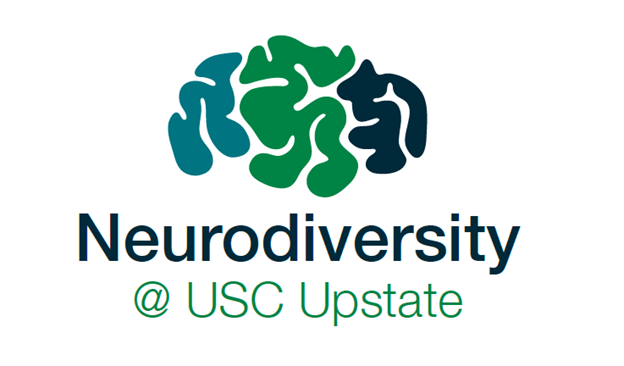The term neurodiversity applies to a range of neurological variations regarding learning and can include (but is not limited to) autism spectrum, dyslexia, dyspraxia, and ADHD. While it is clear schools must do all they can to ensure their learning environments meet the needs of students, USC Upstate is committed to thriving through support of the neurodiverse students, faculty, and staff in our Spartan community.

Neurodiversity Resources
USC Upstate partners with the Neurodiversity Hub, an organization dedicated to establishing careers for neurodivergent adults. Find out resources for students, job seekers, employers, and universities on the Neurodiversity Hub Resources site.
- How do I download Blackboard course files in more accessible formats or have Blackboard read a file to me?
- How do I use the Blackboard Calendar to stay on track with upcoming due dates?
- How do I connect my Blackboard calendar to my personal calendar (e.g. Outlook or Google)?
- How do I customize my email and activity stream notifications in Blackboard to highlight only the emails that matter to me? Recommended: upcoming due dates, new feedback or grades posted, work past due.
- How do I receive accommodations for additional testing time, learning/studying tools, or course material in alternative formats?
- Accessibility and Privacy Statements for Common Course Technology Tools
Click on plus button at the bottom of this Accordion BLOCK (not accordion tab) to create a new tab. Select Accordion TAB block to edit tab headline. Select nested blocks within accordion tab to edit content.
-
In Spring 2022, the interim Provost convened the Neurodiversity Task Force to examine USC Upstate’s current climate regarding neurodiversity, as well as identify best practices regarding training, planning, programming, and curriculum to achieve a more inclusive campus.
The task force reviewed scholarly research, peer and aspirant institutional websites, and initiatives undertaken over the past few years at USC Upstate. Resources were examined to determine what practices (if any) have made institutions better for neurodivergent students without taking away students’ opportunity to learn and become independent; whether neurodiversity was incorporated as a factor across different types of discipline; and if institutions created programming beyond the curriculum. Lastly, the review indicated how families and communities can be affected by the higher education systems (admissions, housing, degree planning, courses, etc.) and the need for policies and procedures to achieve the aims of creating supportive structures for neurodivergence and students who learn differently.
2022 USC Upstate Neurodiversity Task Force Report with Resource Links
-
- Amanda Karls, Director of Institutional Effectiveness and Compliance; Co-Chair
- Kara Lee, University Supervisor/Instructor, School of Education; Co-Chair
- Dr. Kenneth Barideaux, Assistant Professor, Psychology
- Victoria Lockhart, Transfer Advisor and Student Services Coordinator
- Dr. Renu Pariyadath, Professor, Communication
- Dr. Shannon Polchow, Professor of Spanish
- Amber Puckette, Academic Advisor, Student Success Center
- Dr. Kristina Randall, Assistant Professor, Department of Human Performance and Health
